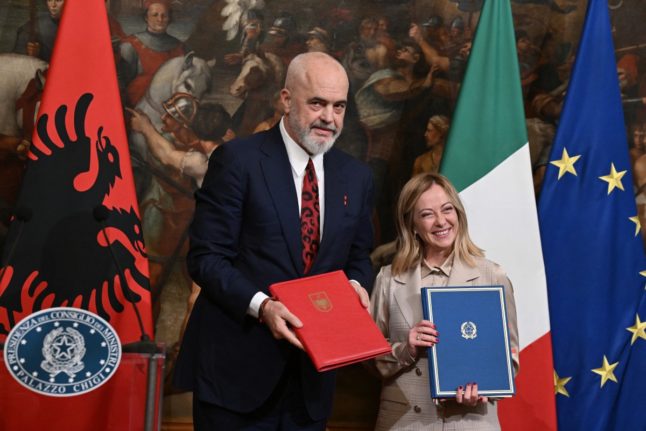The agreement signed by the Italian and Albanian prime ministers last month has been condemned by opposition parties in both countries, as well as non-governmental groups.
Under the unique deal, two centres will be established near the Shengjin port in northern Albania to handle around 36,000 people a year sent by Italy to be screened to see if they qualify for asylum in Italy.
READ ALSO: What’s behind Italy’s soaring number of migrant arrivals?
The deal still faces multiple legislative and legal hurdles in Albania before it can be implemented.
On Wednesday, Albania’s Constitutional Court temporarily blocked ratification of the agreement by lawmakers and ordered a public hearing next month to determine whether the agreement violates the constitution.
The government has launched a full-throated campaign to rally support for the deal ahead of any potential vote. “We are not selling a piece of land of Albania,” Interior Minister Taulant Balla told AFP during an interview.
“We are offering this land to Italy like we usually do for example when we set up an embassy,” he added, saying jurisdiction inside the camp would belong to Italy, but the land itself would remain in Albanian hands.
READ ALSO: How has Italy’s ‘anti-immigrant’ government changed the rules for foreigners?
Italy is set to cover the entire cost of the project including any additional expenses incurred by Albanian police providing security outside of the camp.
“The government of Albania has the right to negotiate such agreements on behalf of the republic of Albania,” Balla added, calling the deal “completely based on the constitution”.
The minister also promised there would be “no violation” of the human rights of individuals sent to Albania.
Balla called the deal a gesture of “solidarity” with Italy, citing Rome’s consistent support for Albania following the fall of communist rule in the early 1990s.
Italy has seen a dramatic rise in migrant arrivals by sea in recent months, with 145,000 since January against 88,000 for all of 2022.
The International Rescue Committee and Amnesty International rights groups have opposed the accord, while the UN refugee agency said it was not consulted.



 Please whitelist us to continue reading.
Please whitelist us to continue reading.
Member comments